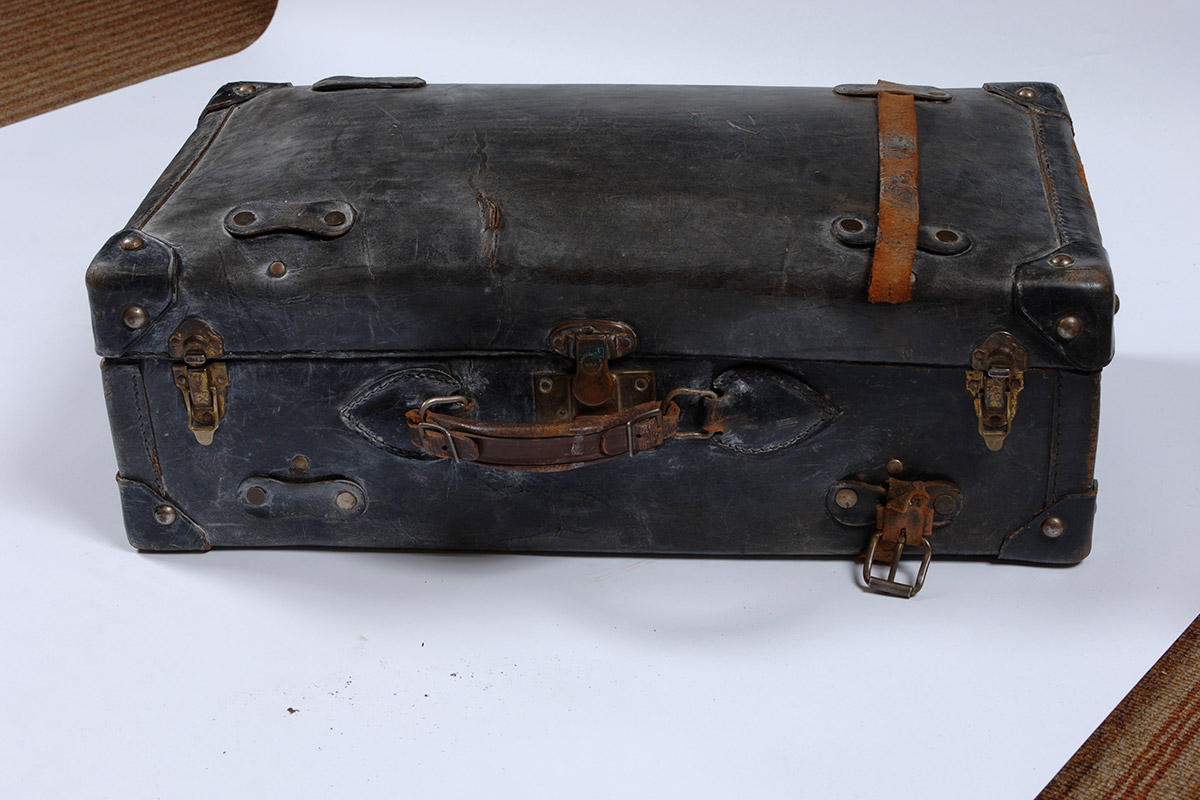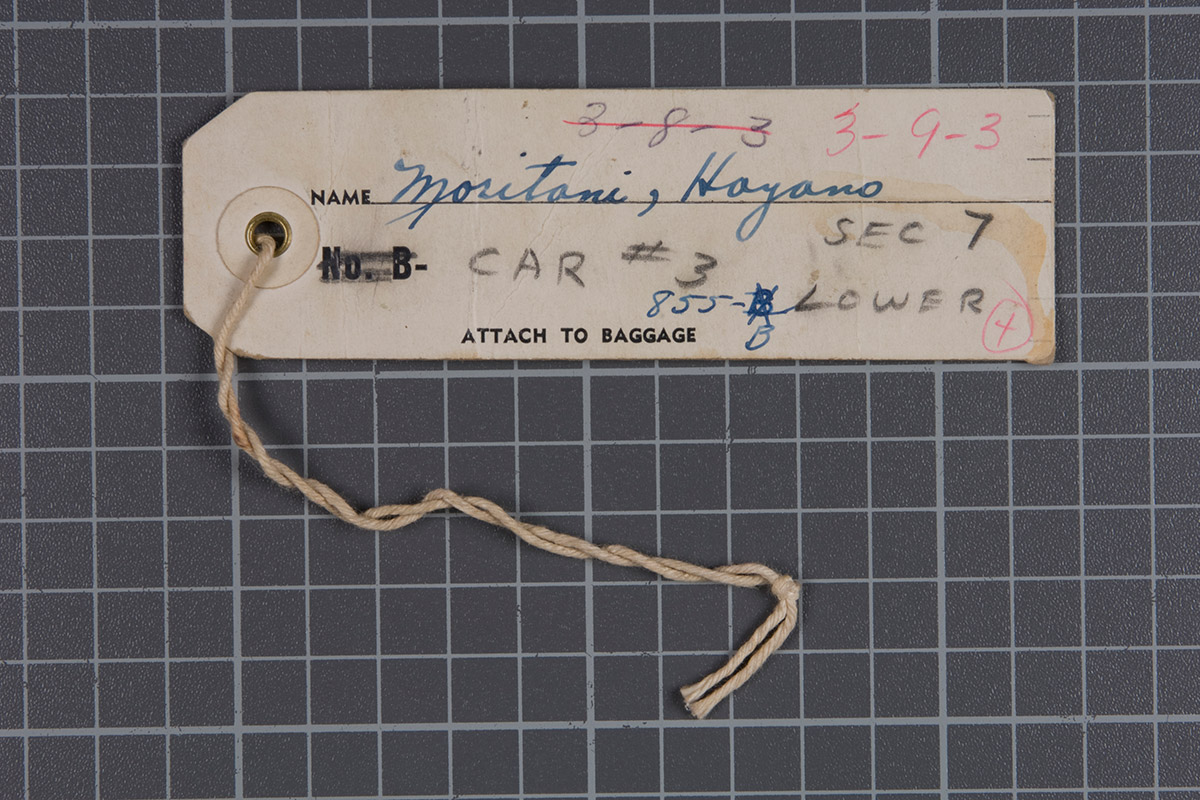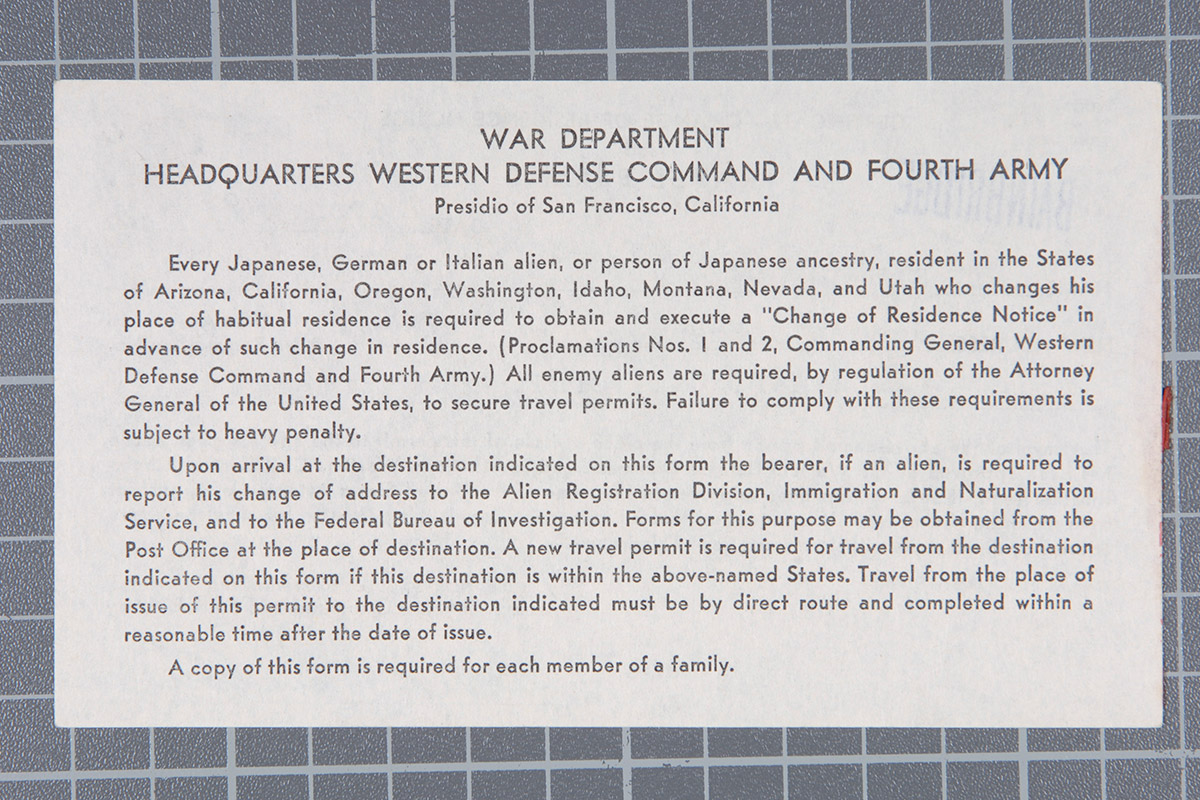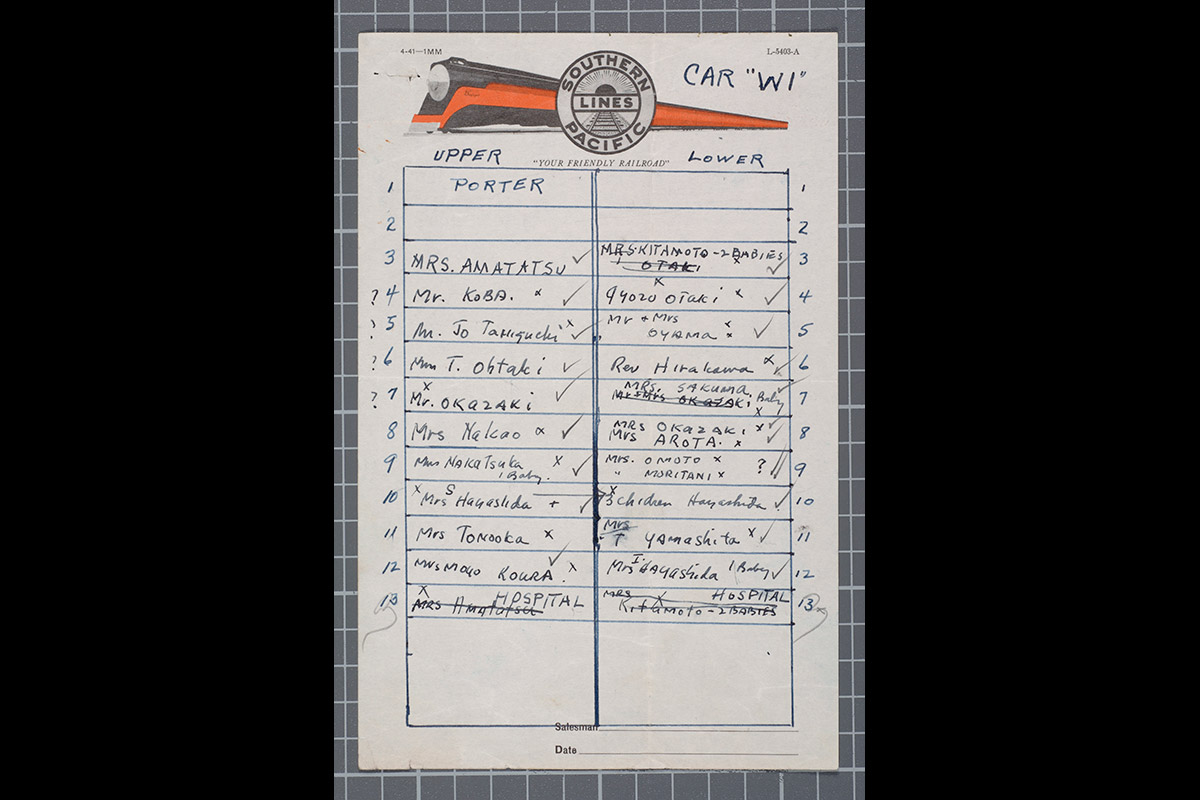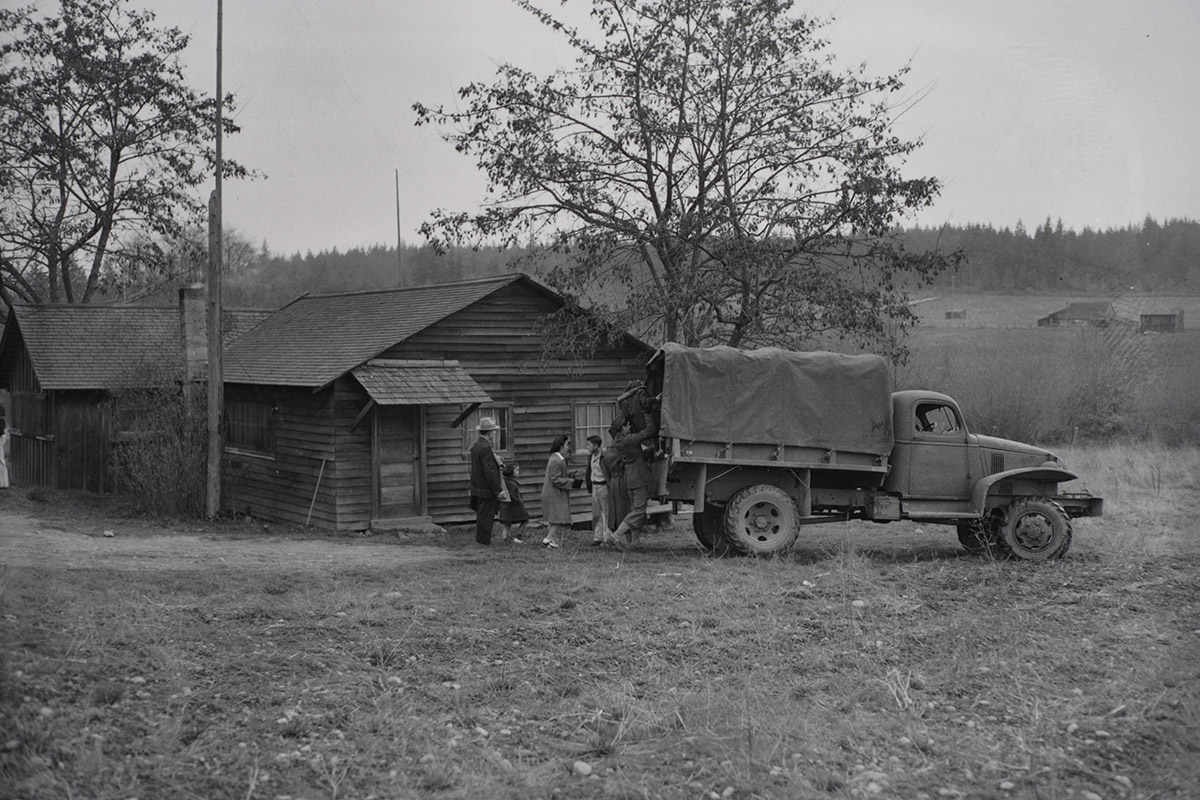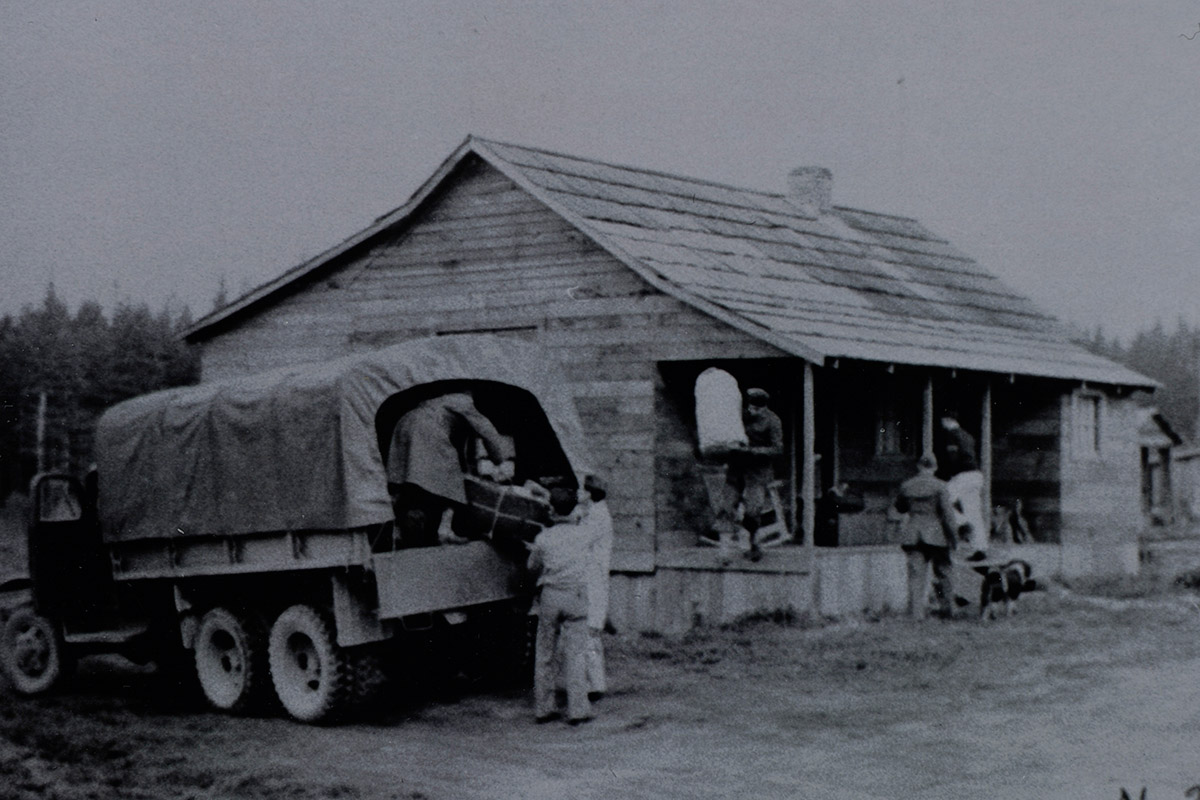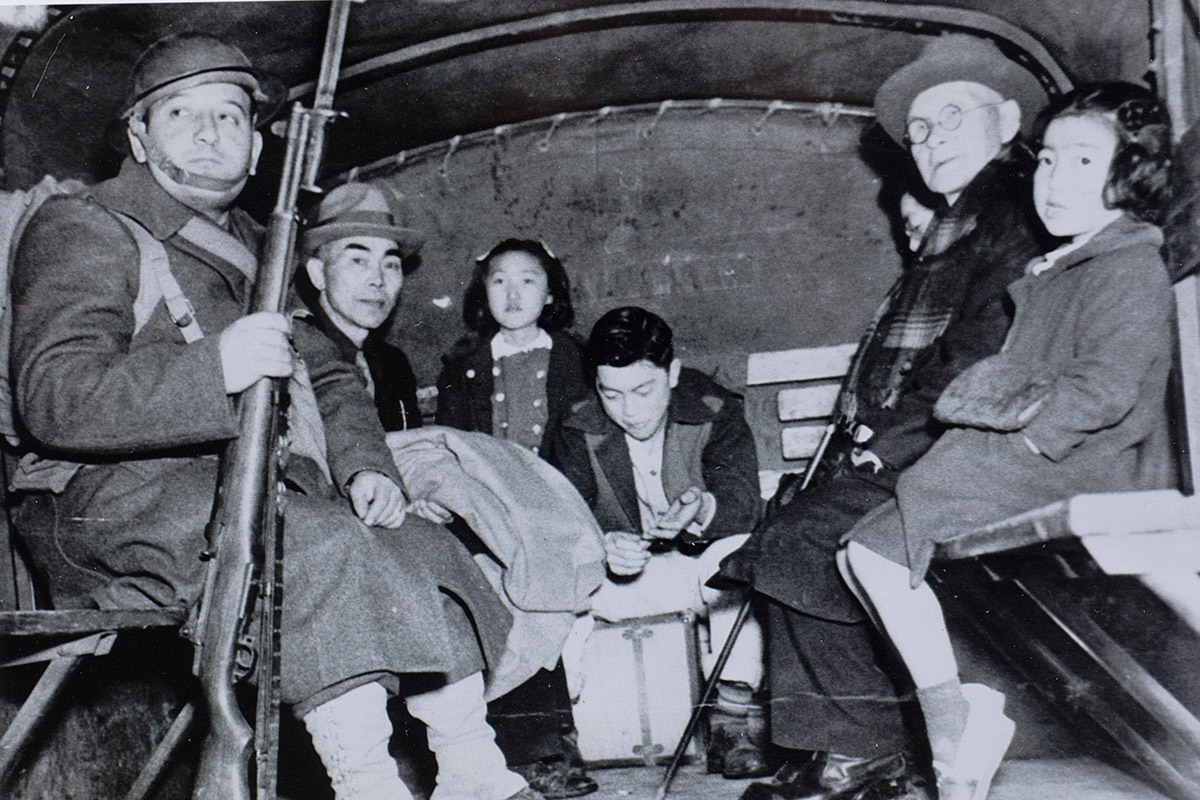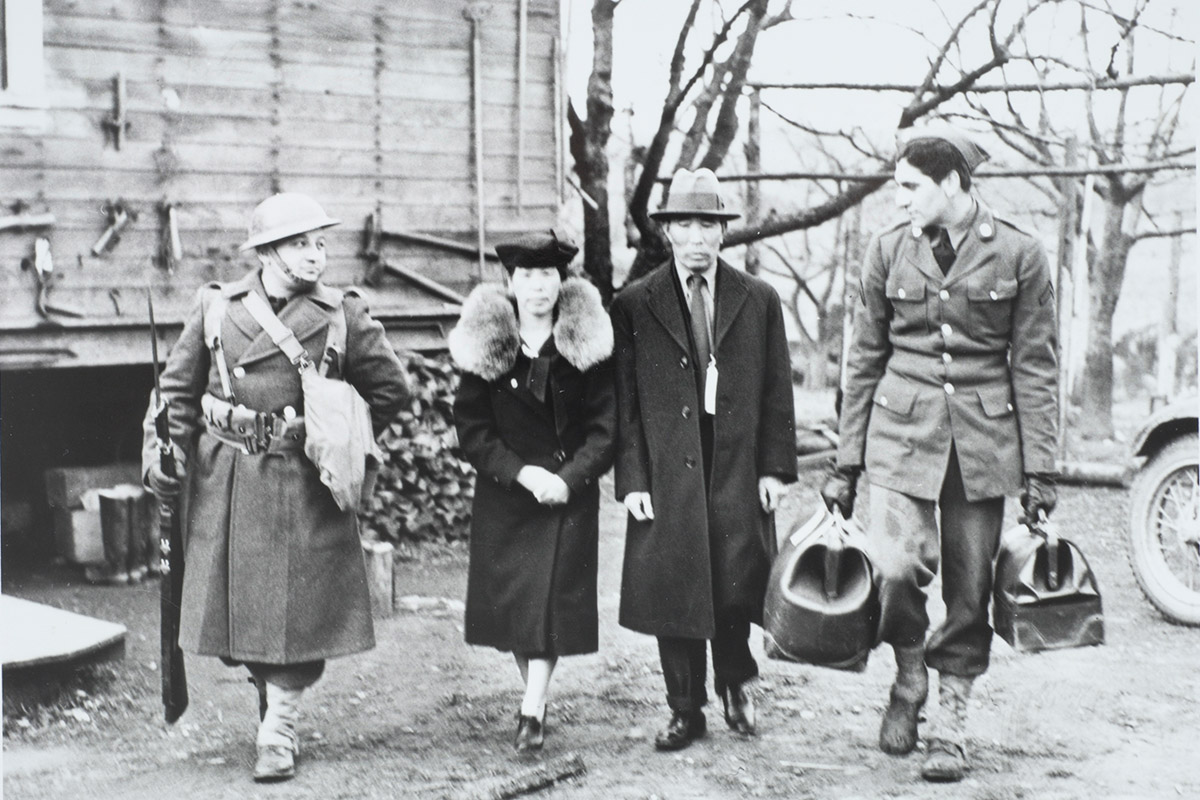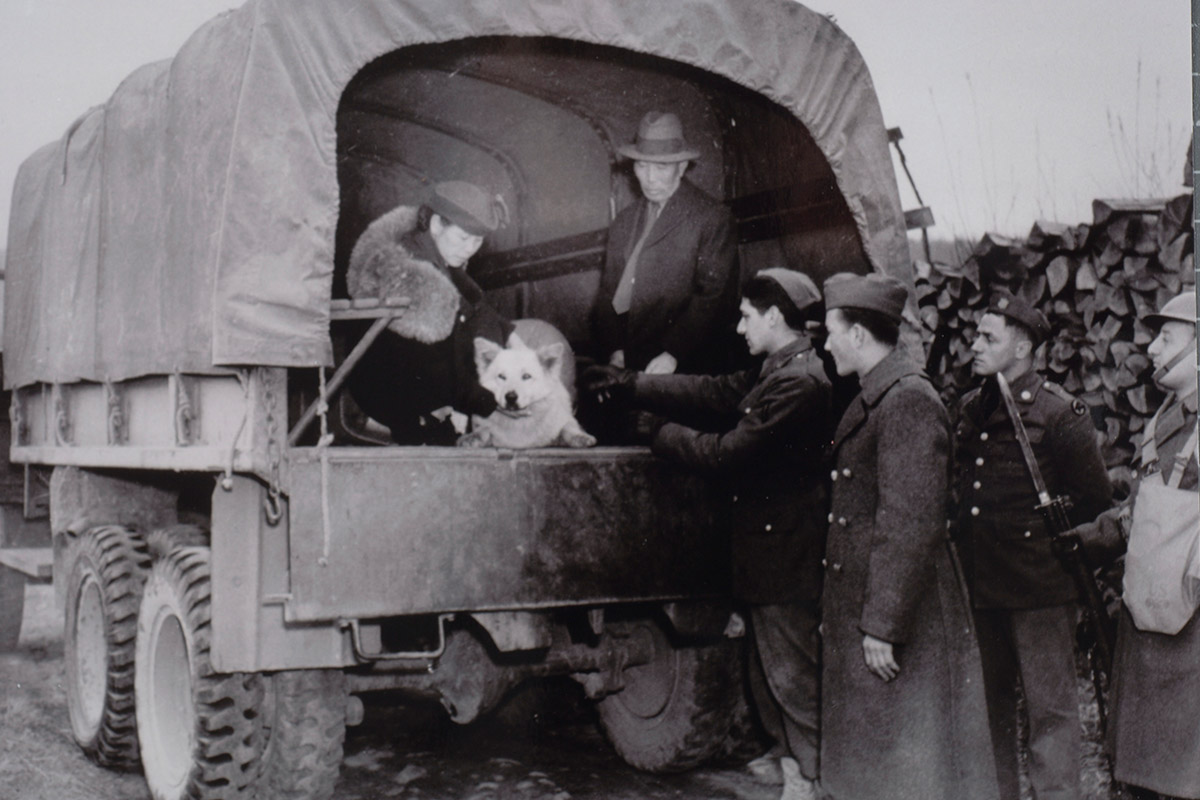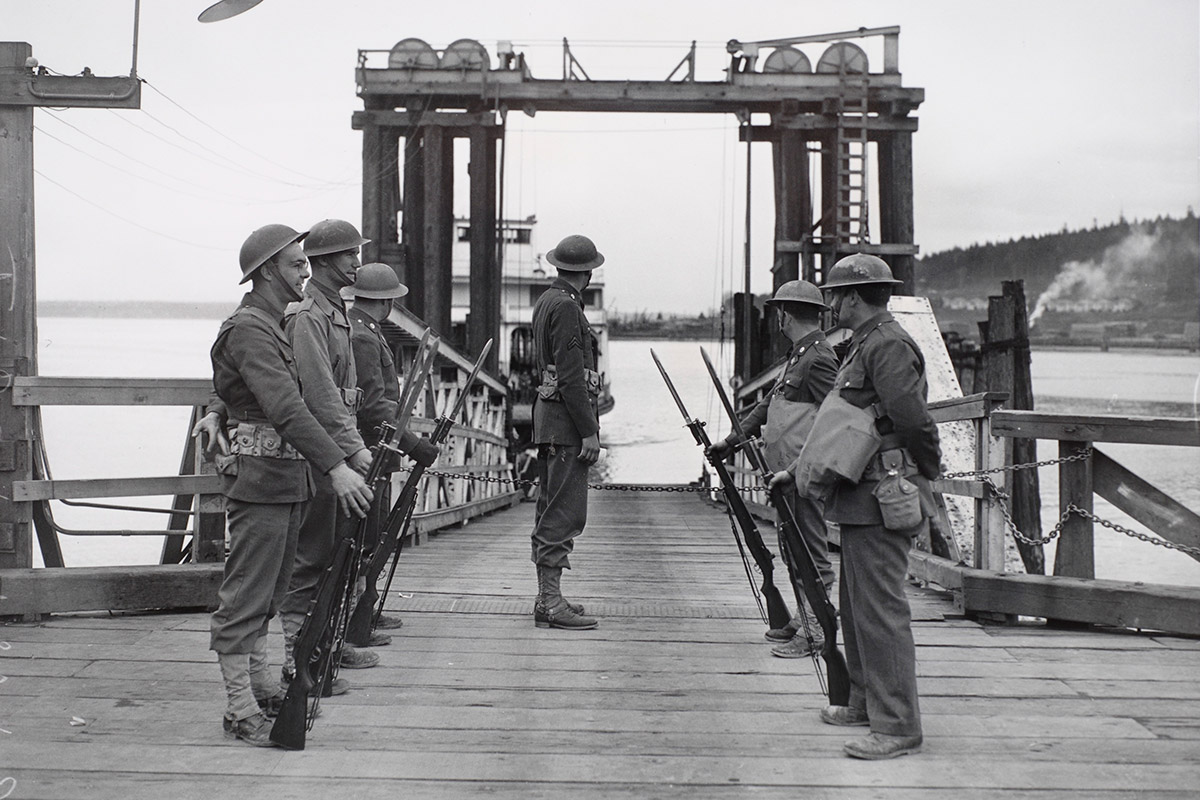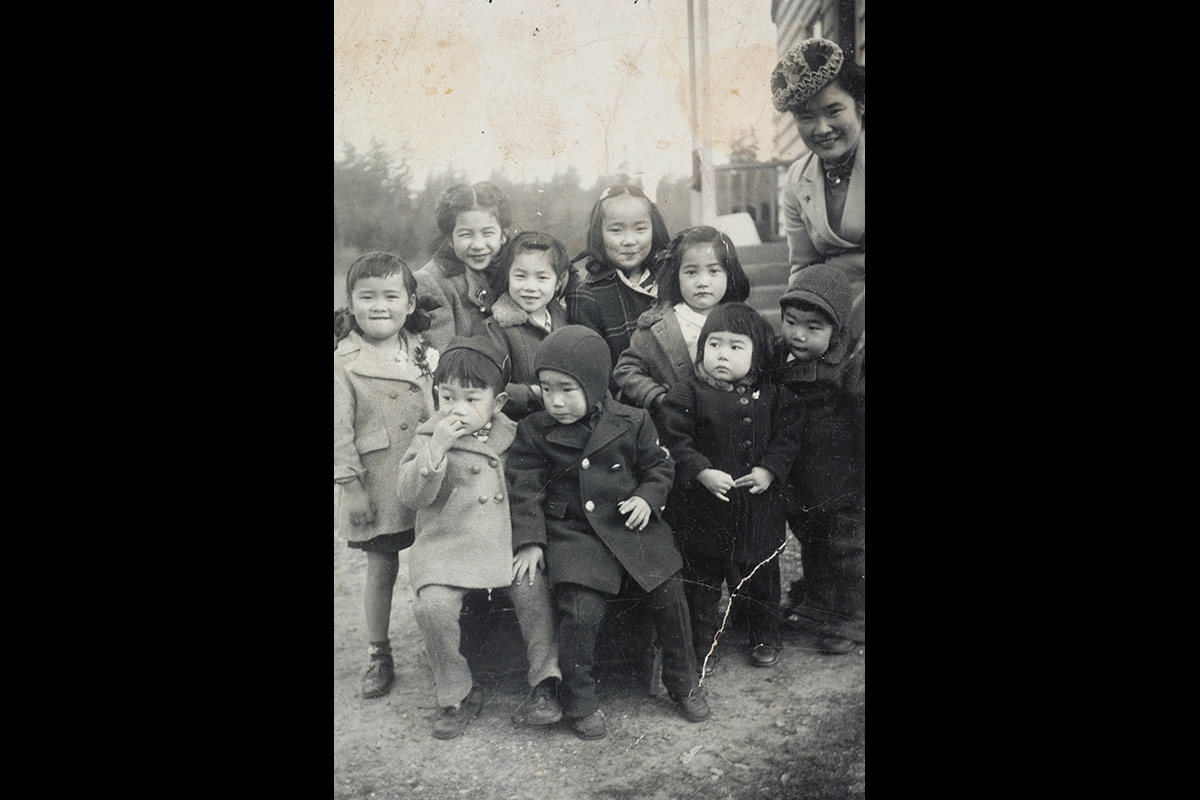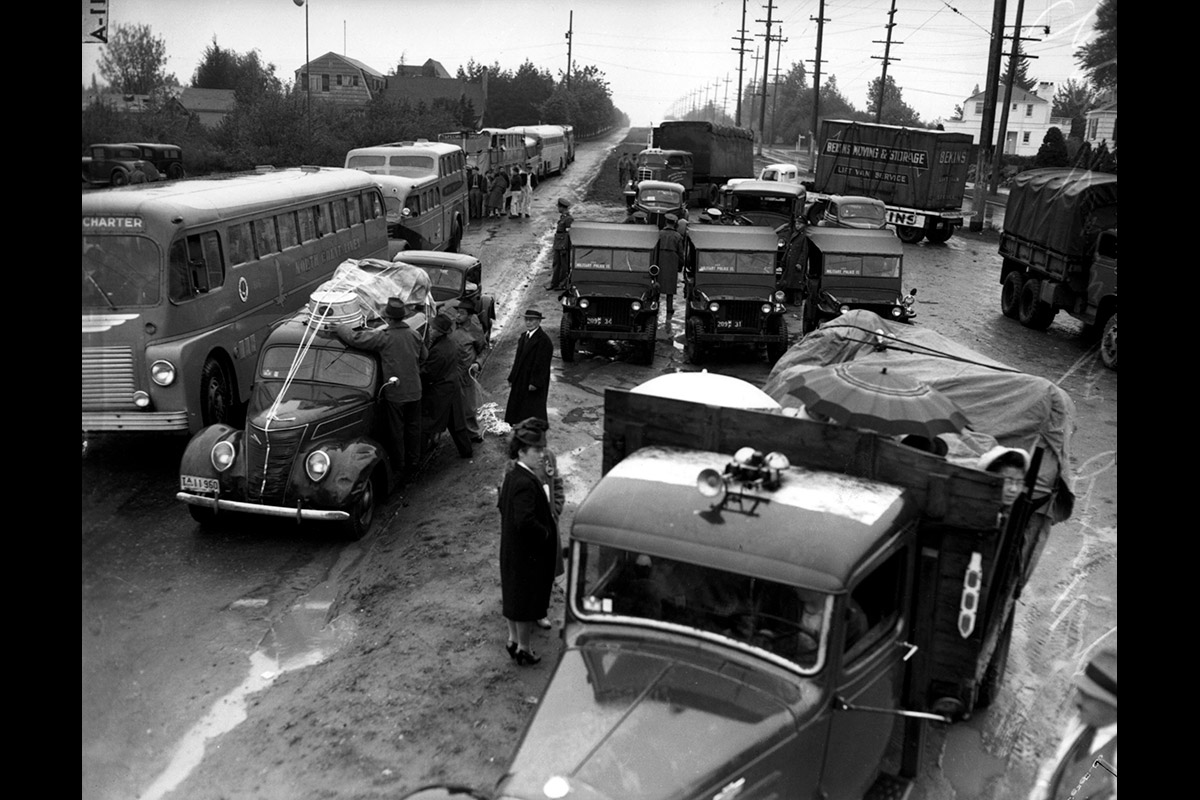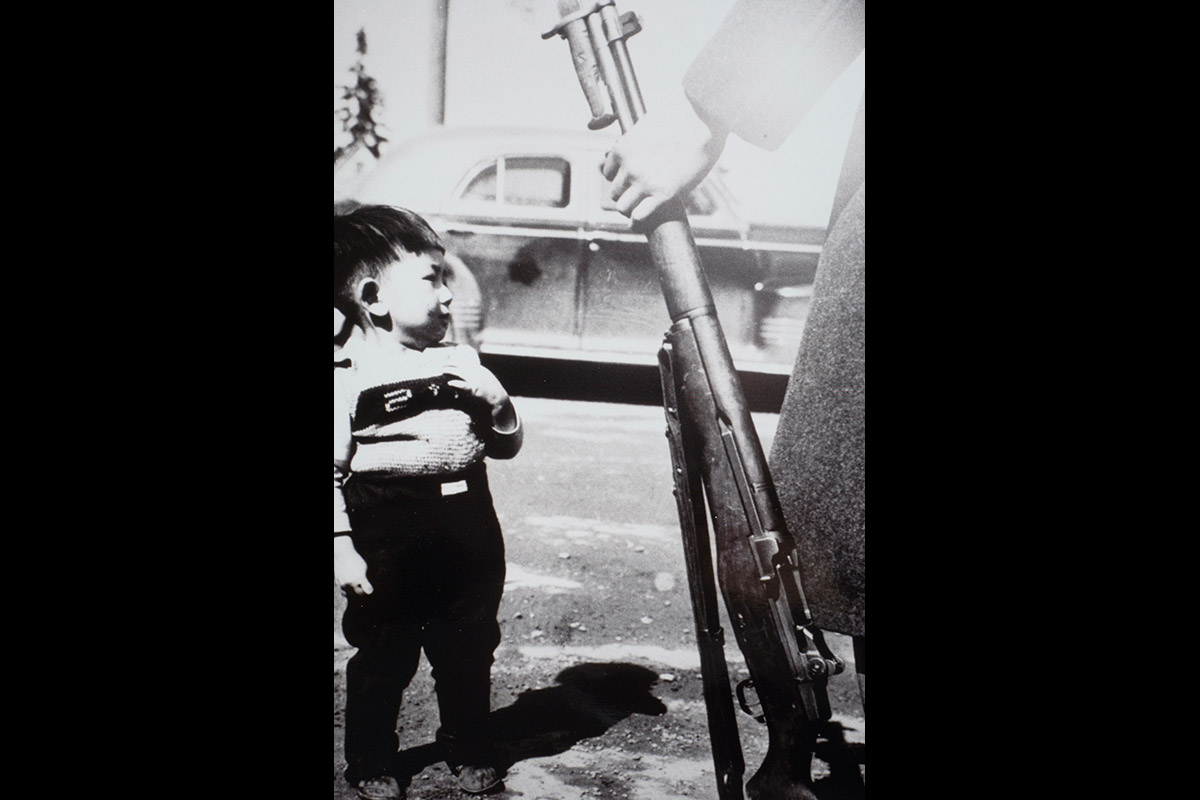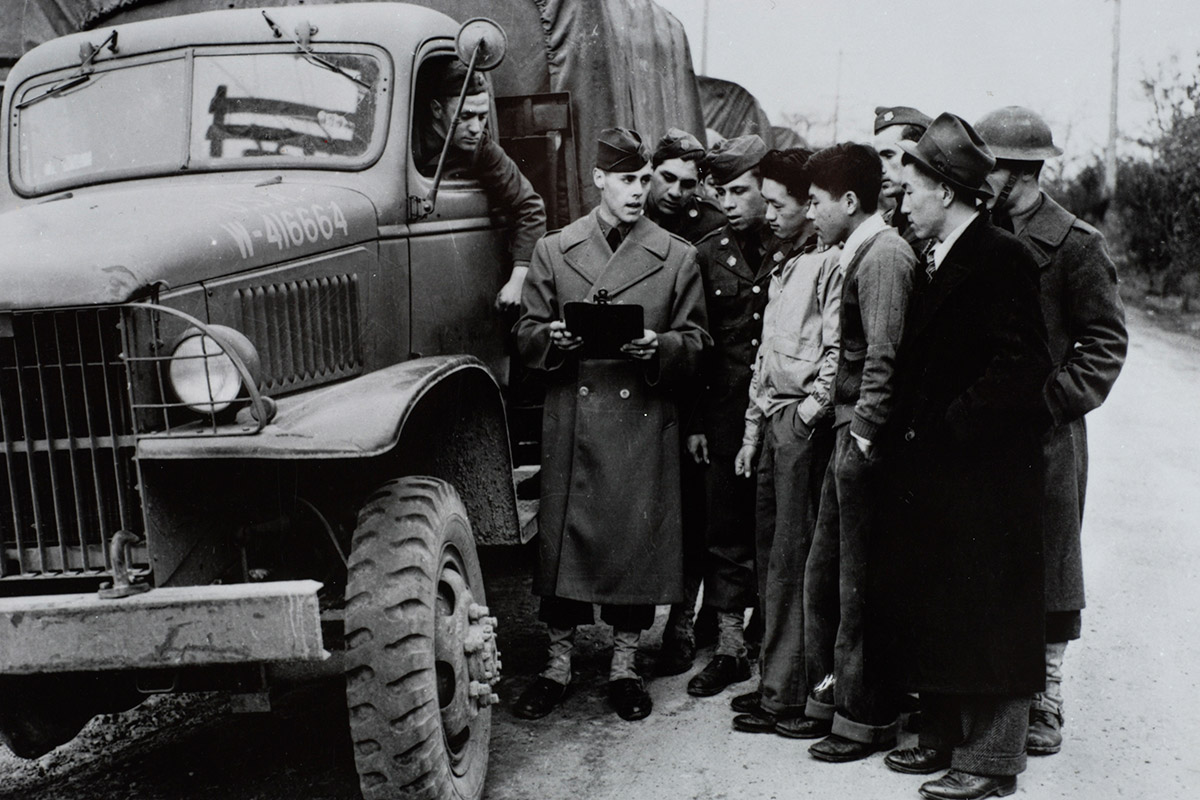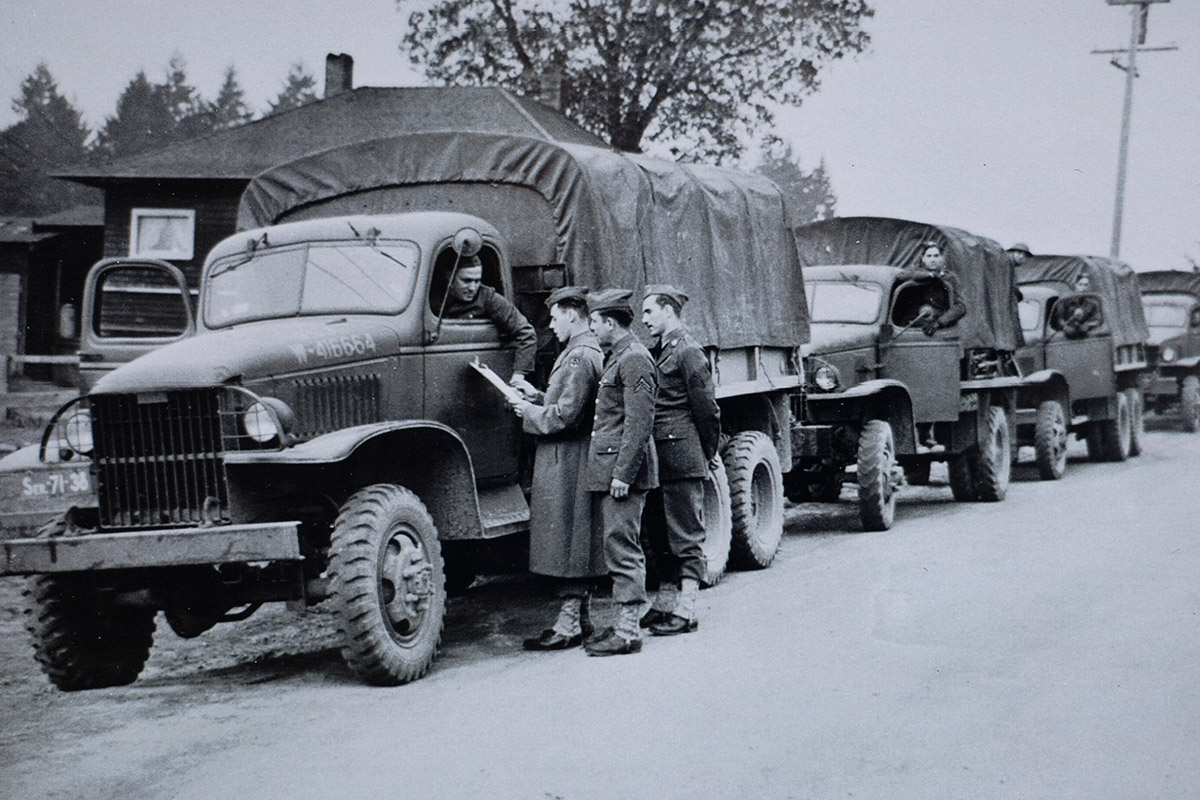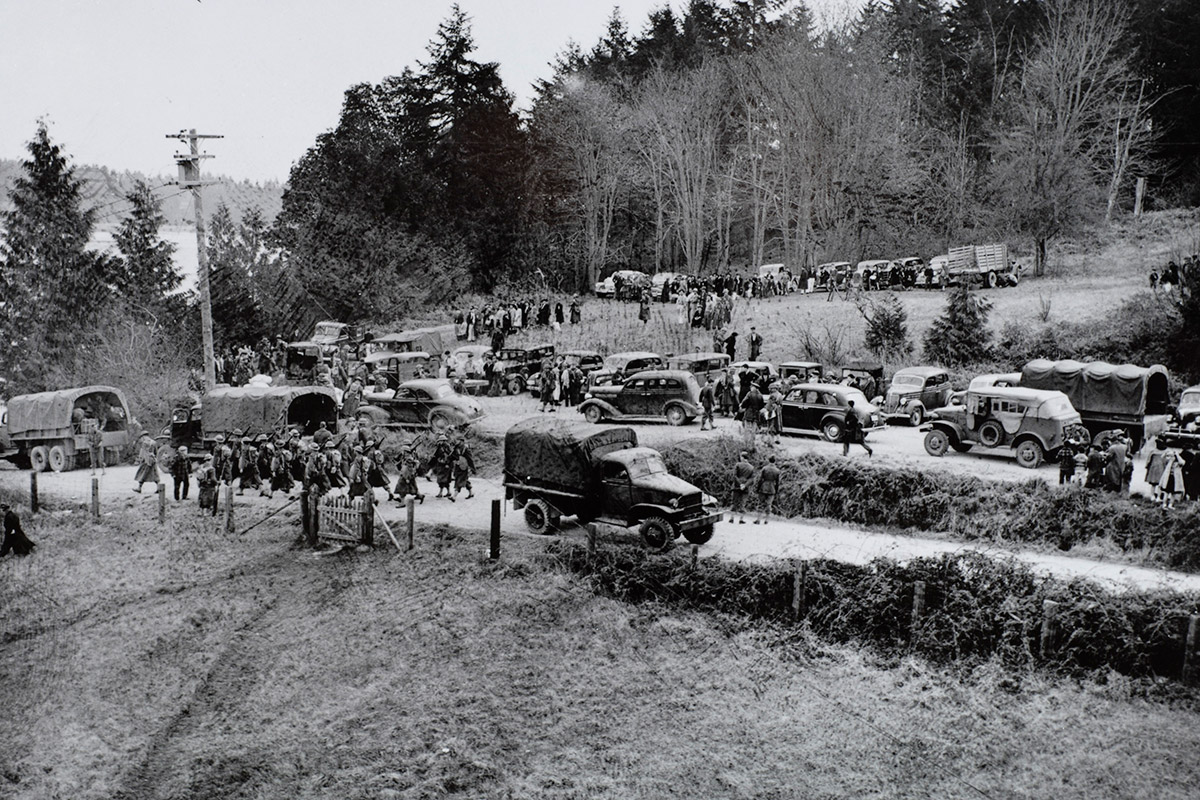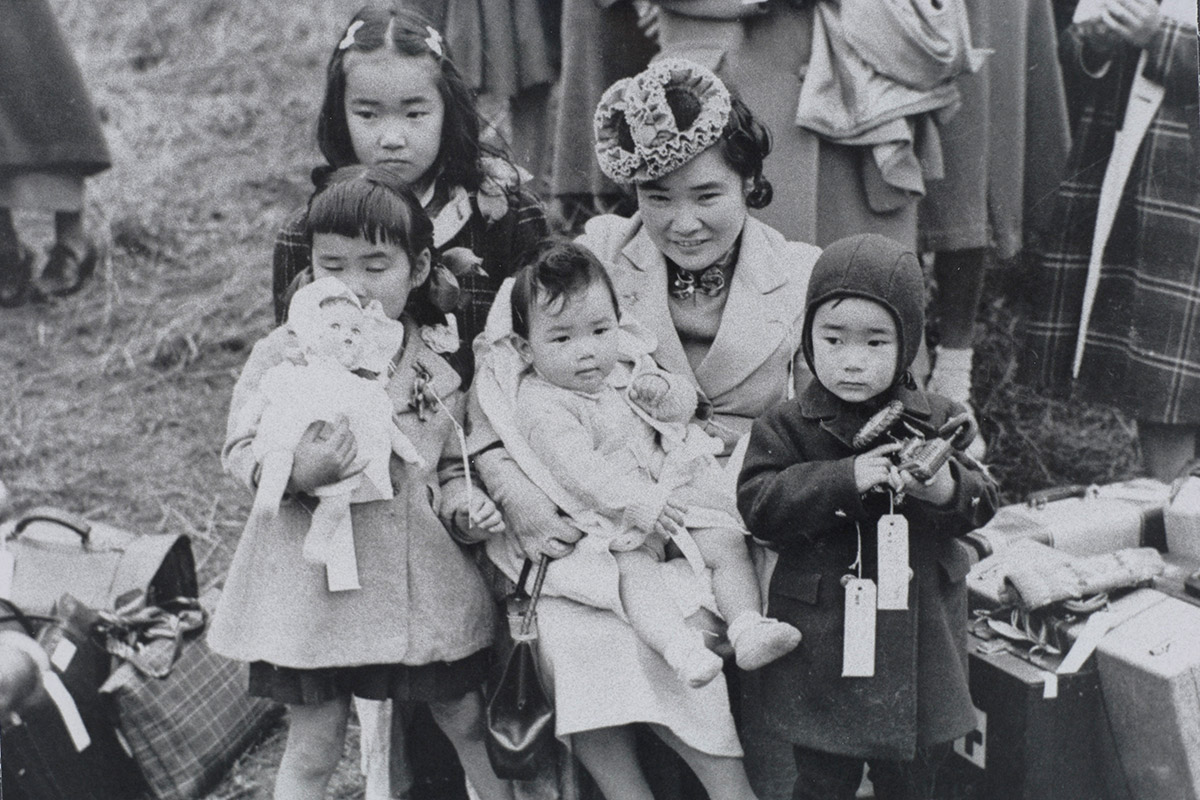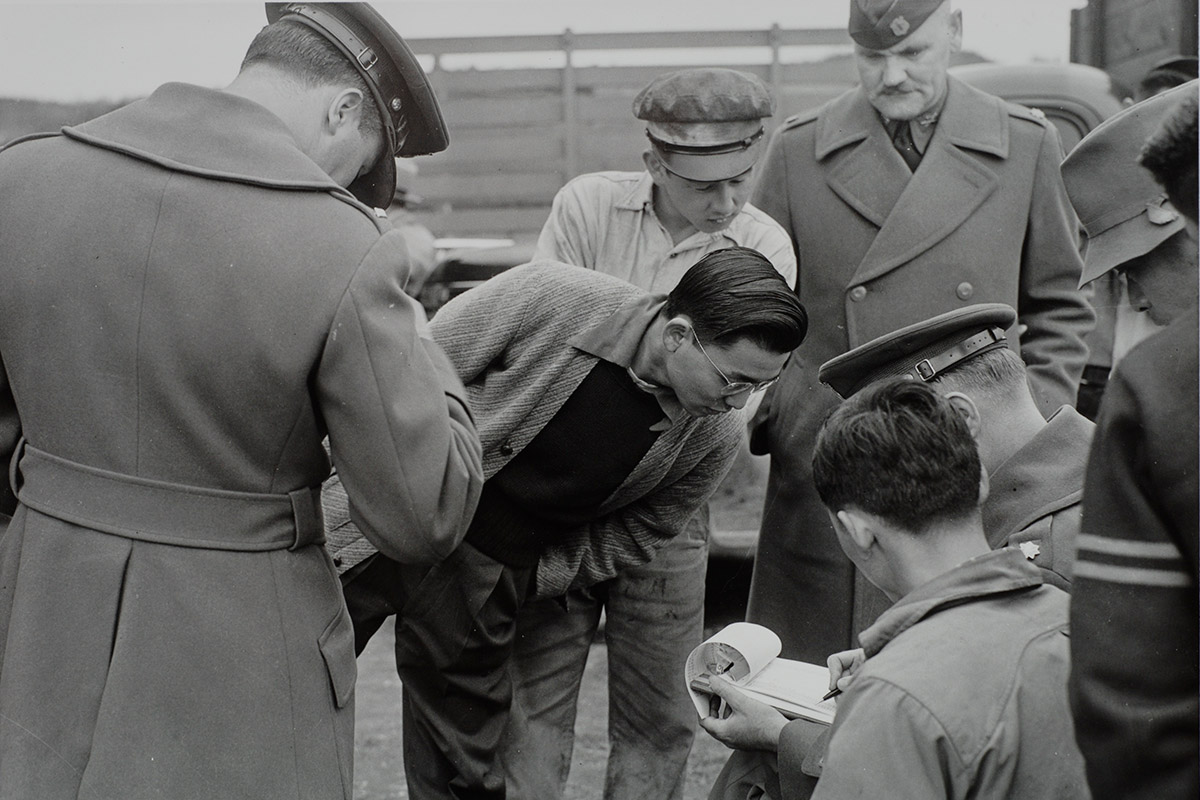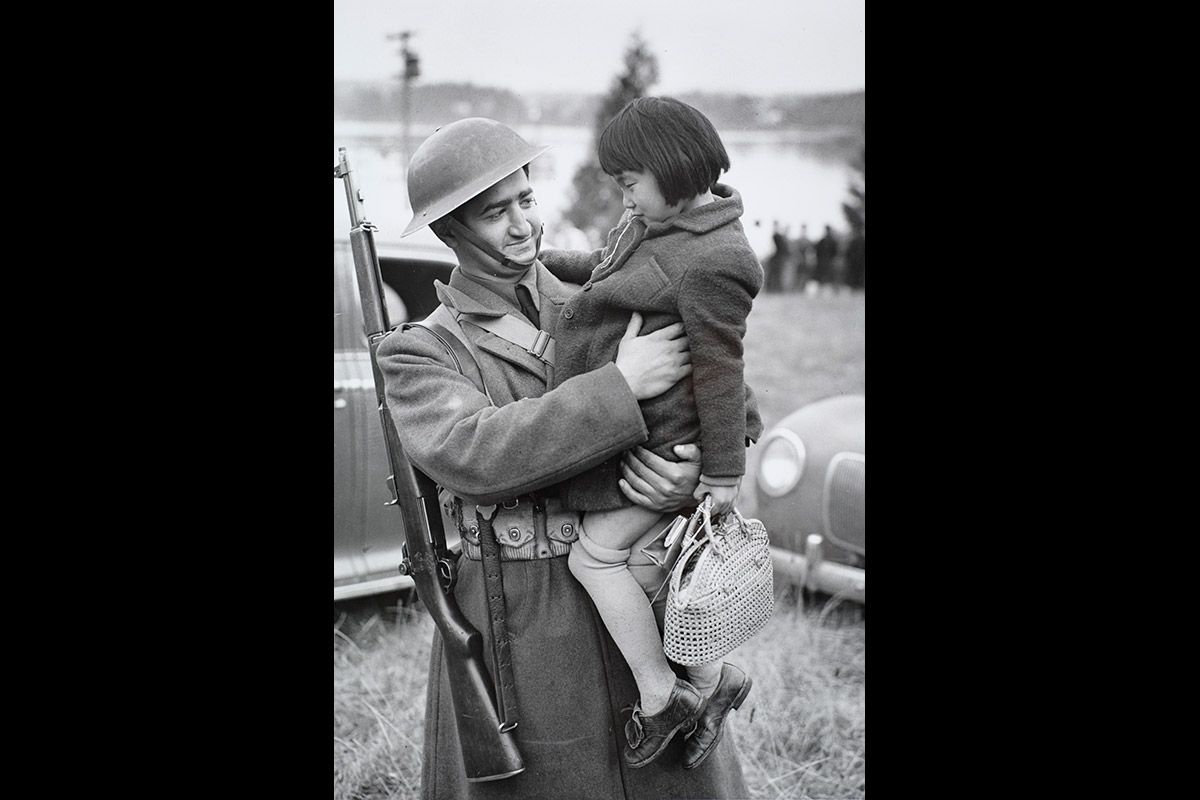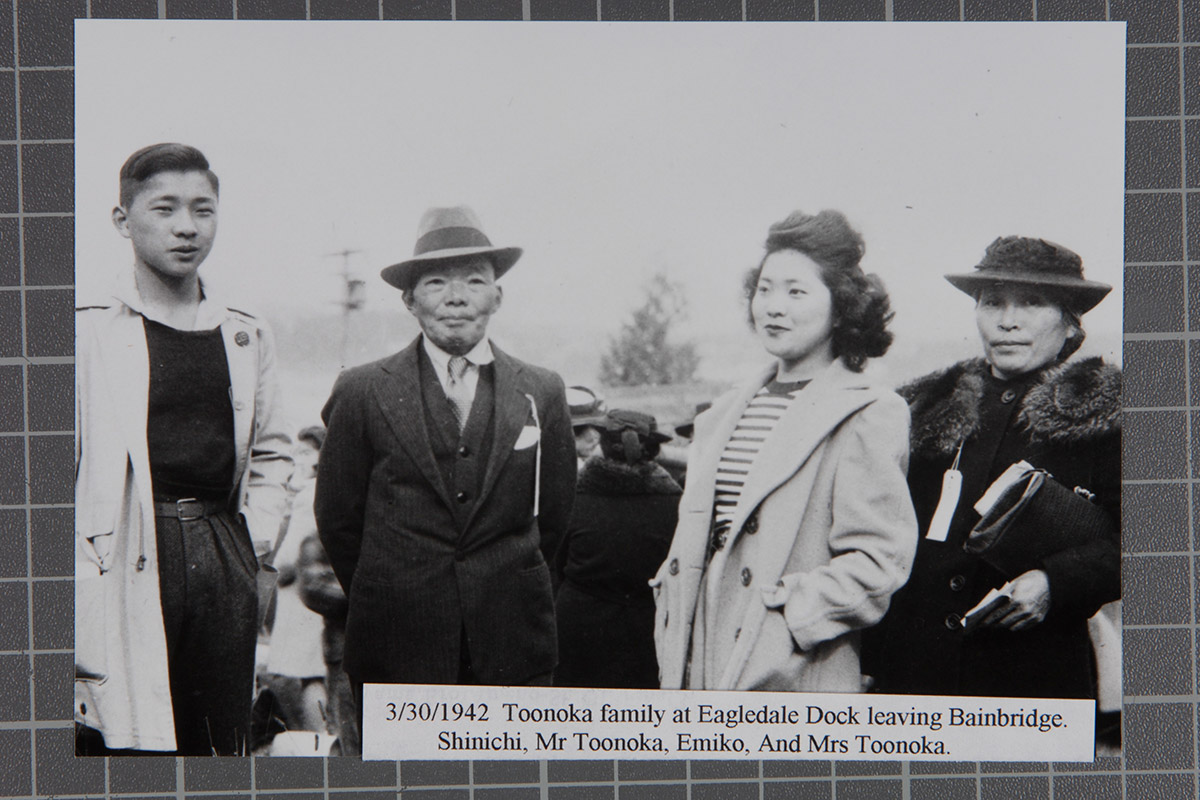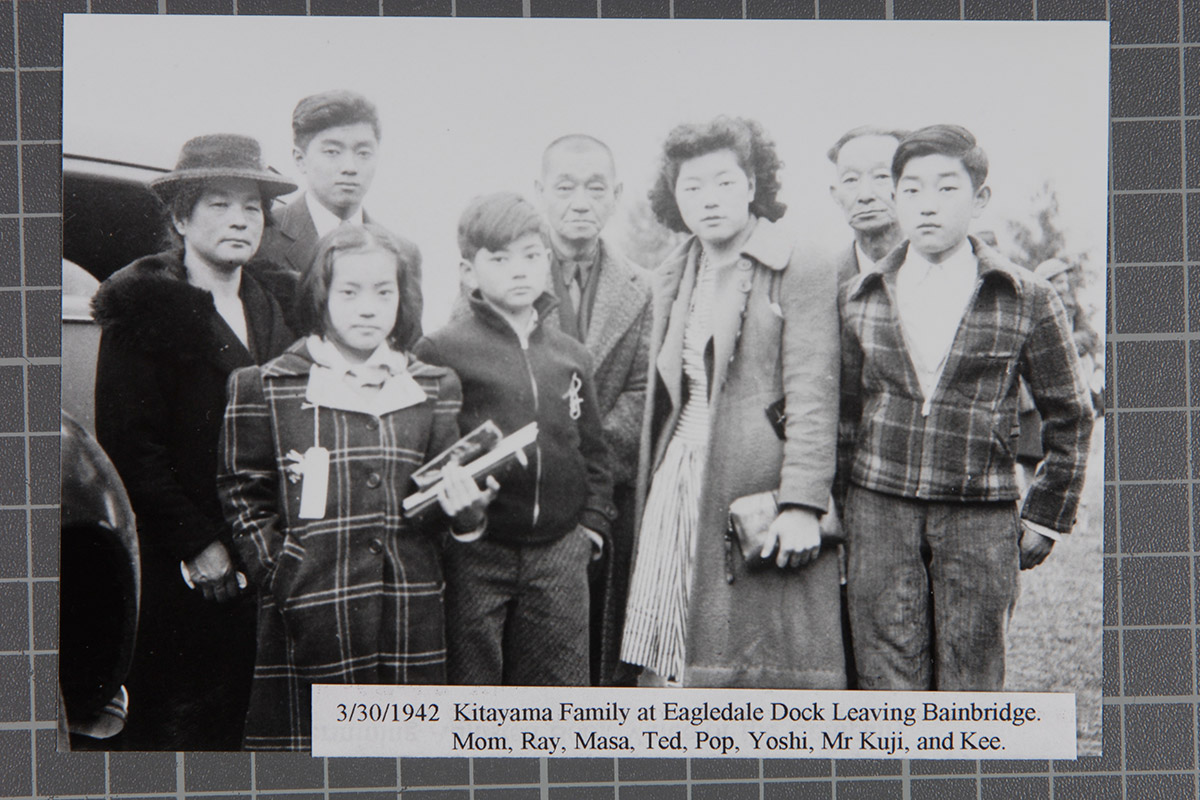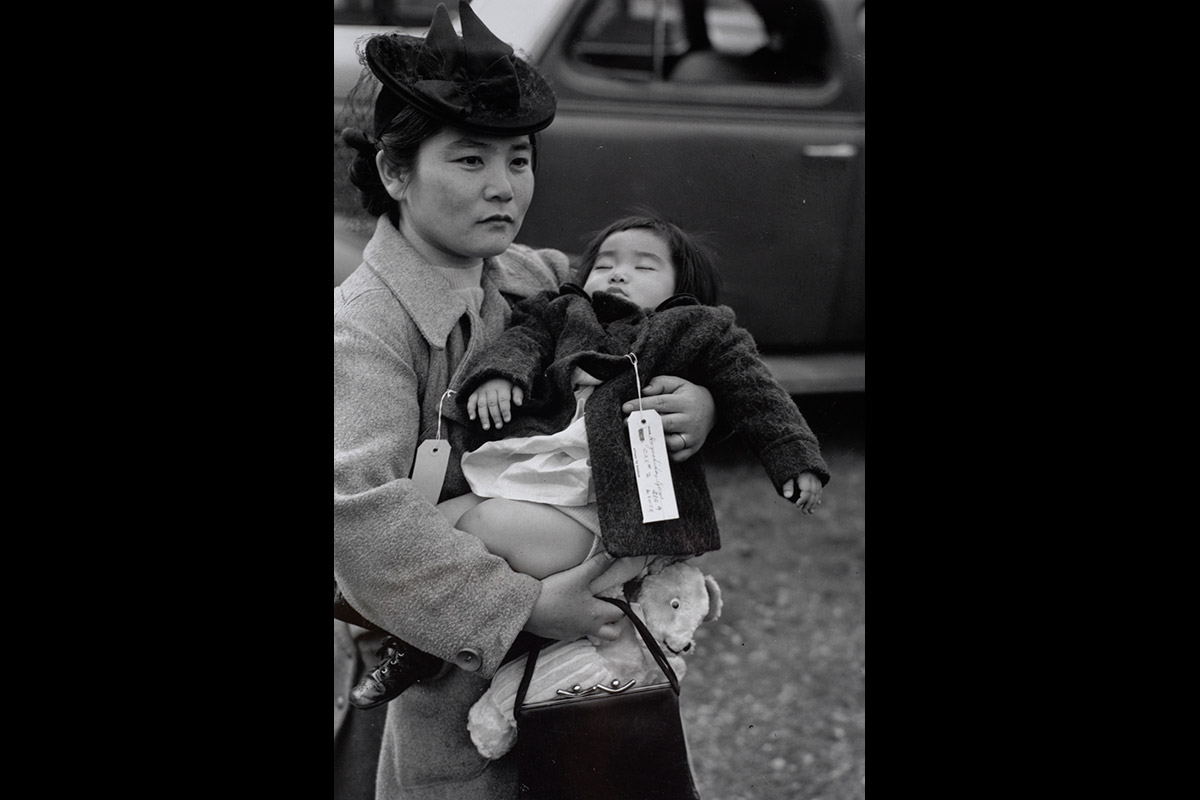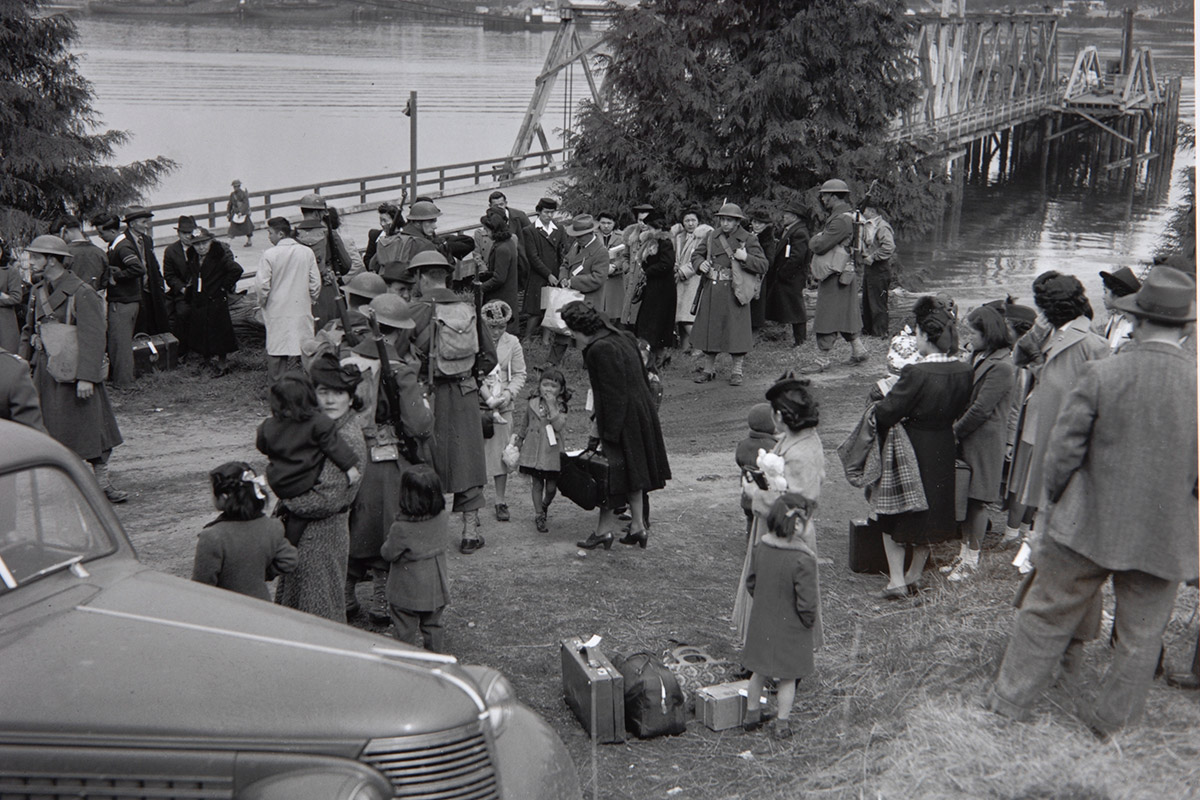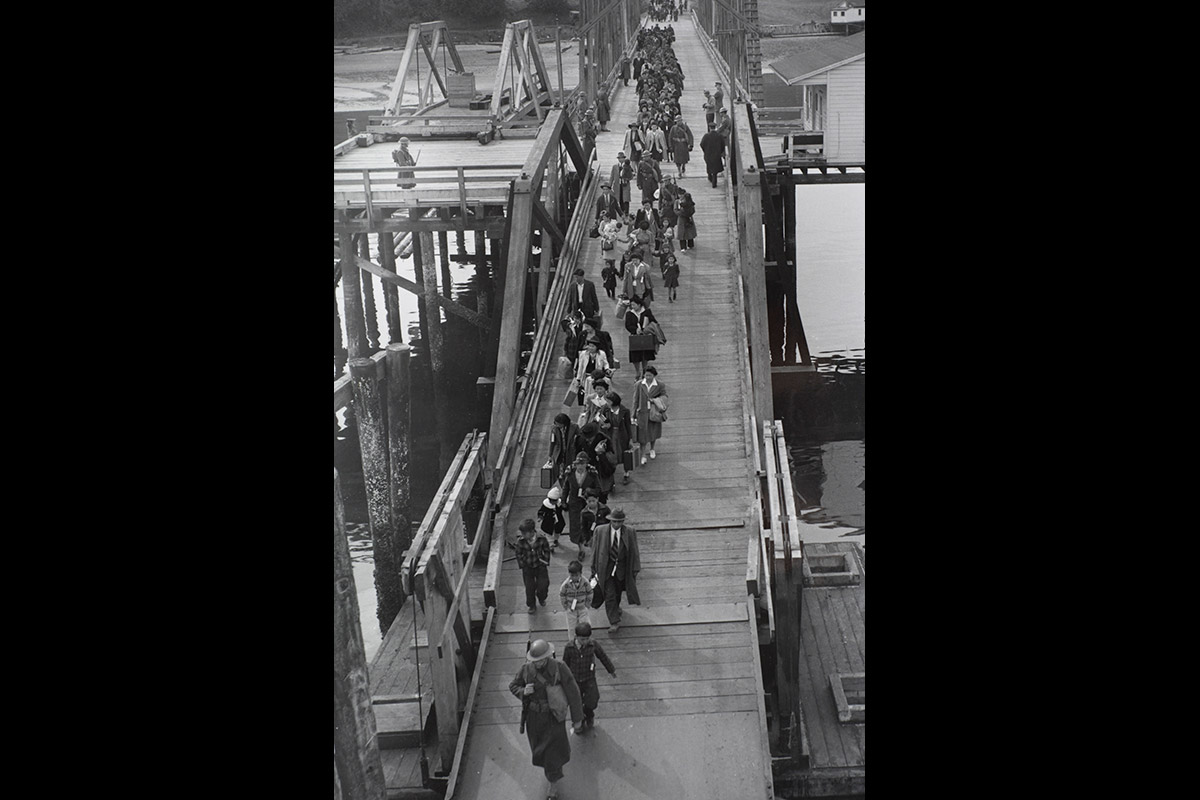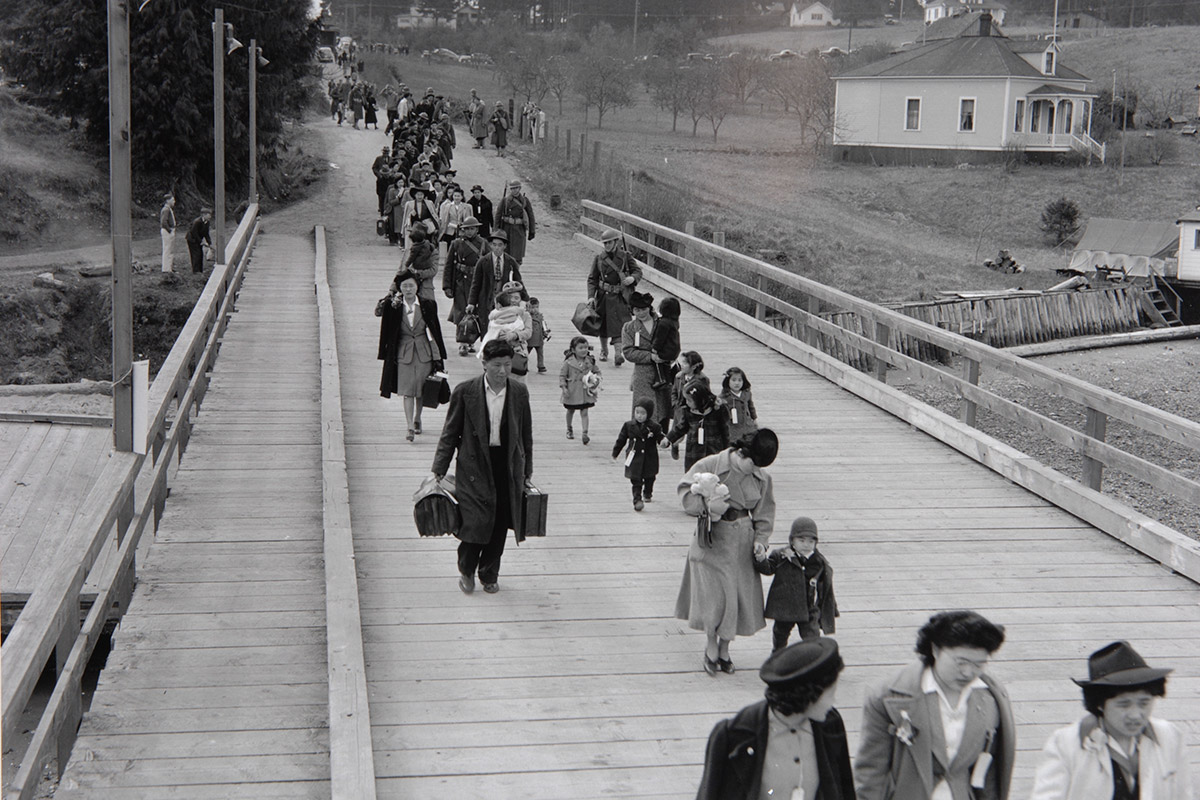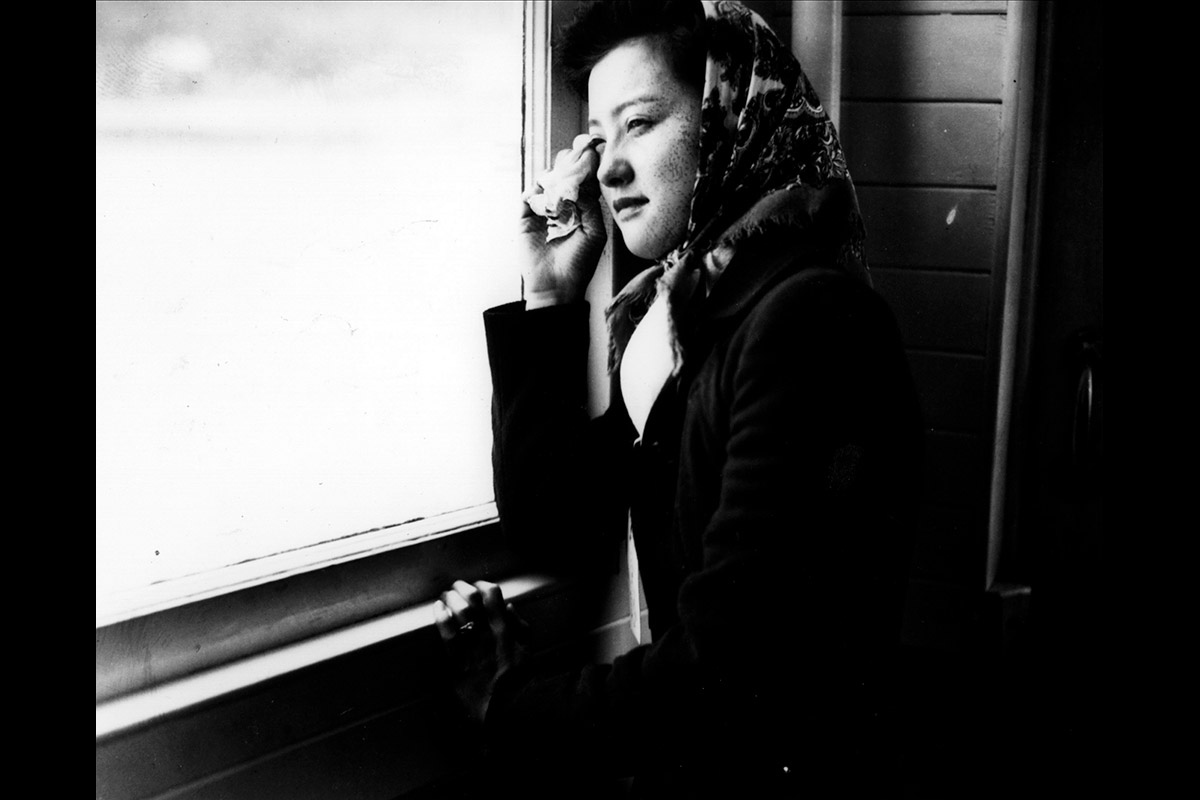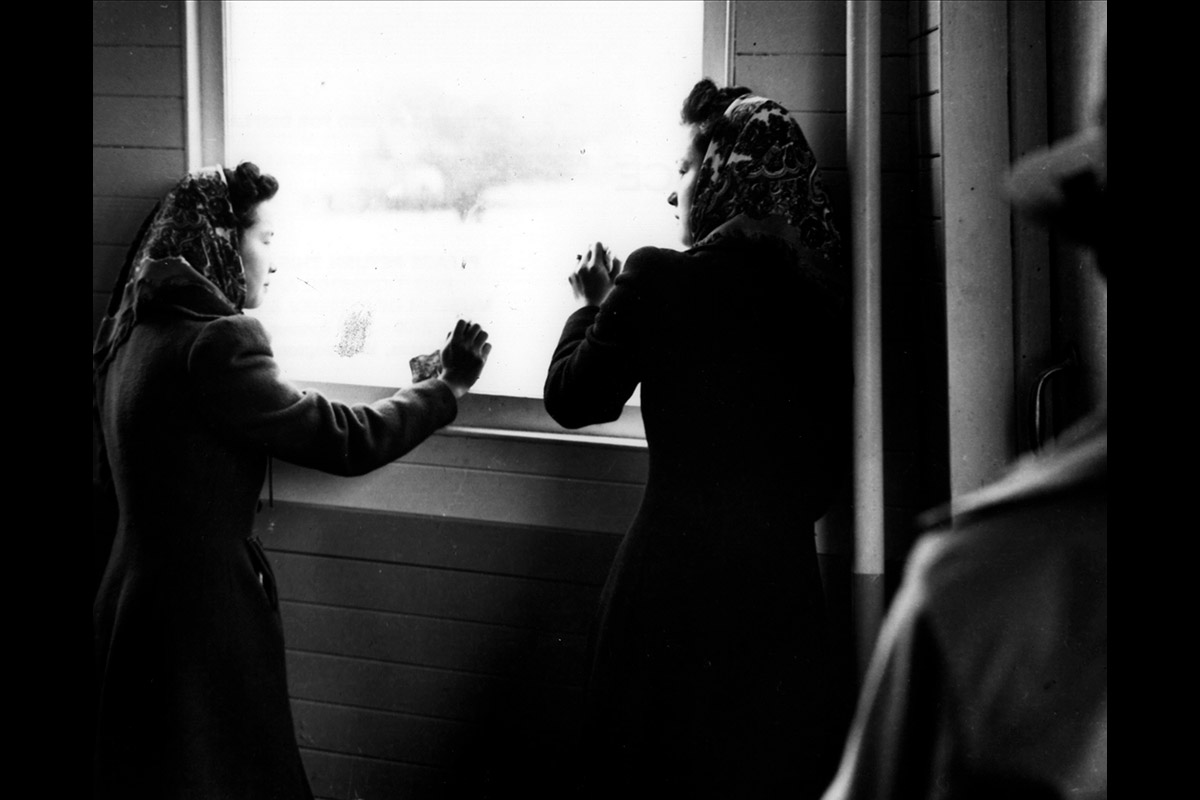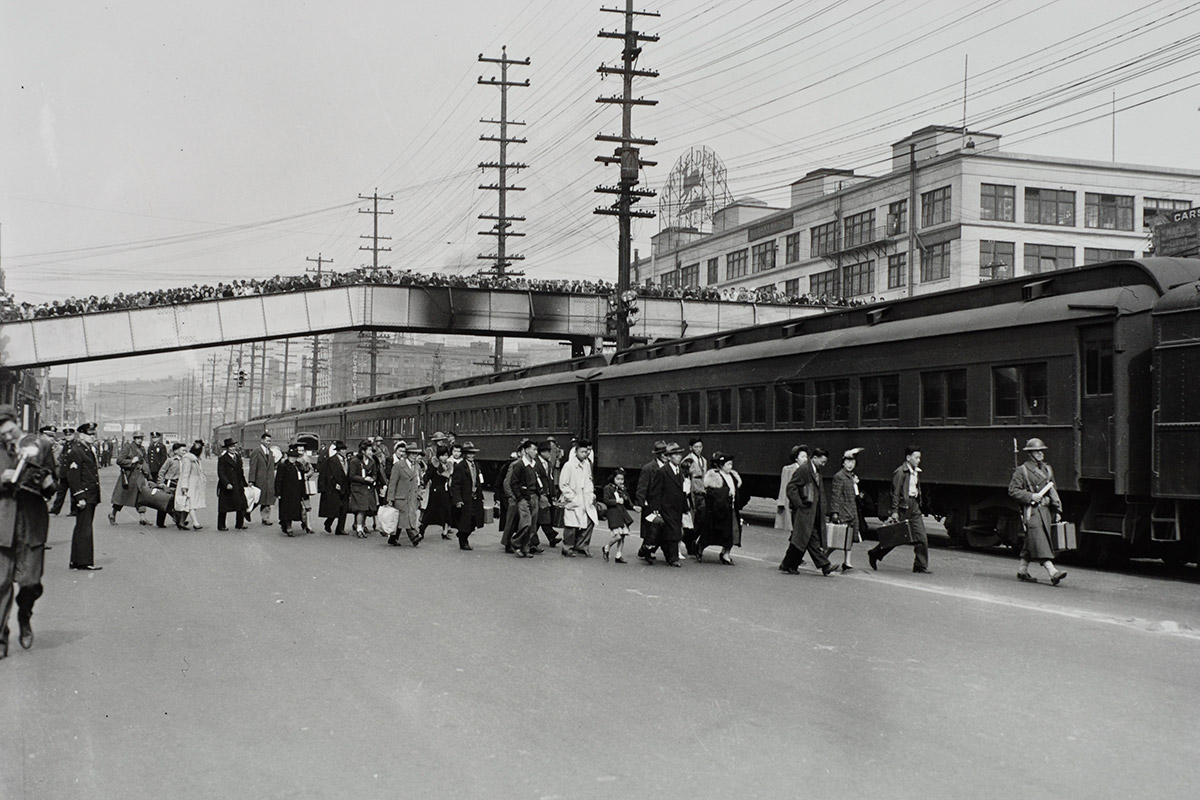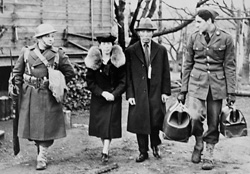
Soldiers and Mr. and Mrs. Moji on Day of Forced Removal
On the morning of March 30, 1942, army trucks appeared at Island Nikkei homes to transport families to the Eagledale ferry dock where the Kehloken waited to take them to Seattle. Bainbridge High School allowed students to miss school to say "good–bye" to their friends; many younger students played "hooky" to see their friends off. Earl Hanson, a 1941 graduate, told one of the soldiers, "You're taking away some of our best friends. "Adults, as well as young people, came to wish their departing neighbors well.
A frightened, well–behaved group of Americans, allowed to take only what they could carry, waited to begin a journey without knowing where they were going, nor how long they would be gone. In Seattle they would board a train. With curtains drawn, they rode through the night.
On April 1, they transferred from the train to buses and traveled through the California desert. After a few hours, Kay Nakao looked out the window and saw a desolate piece of land with tarpaper–covered buildings. She told a woman sitting next to her, "I would hate to have to live there." Her heart sank when the buses turned into this compound that was the Manzanar Assembly Center (later the Manzanar Relocation Center.) There were a few Japanese bachelors already living there who were completing the construction of the camp. The Bainbridge Islanders were the first families to arrive. For weeks they had no sewer system and the facilities were very crude.
Slideshows
Two hundred twenty–seven Bainbridge Islanders were forced to leave on the morning of March 30, 1942. For many this was their first long trip away from home. From Zenmatsu Seko, age sixty–nine, to Chiseko Kitamoto, age nine months, evacuees of all ages had to wear numbered identification tags and carry special permits to travel. They were brought to the only government facility ready to accept prisoners. At that time Manzanar was to be a "Reception Center," a place to temporarily house evacuees. It would later become a "Relocation Center" with a population of approximately 10,000 persons of Japanese ancestry
A collection of artifacts from the day of forced removal
 This is an example of a suitcase that may have been used during evacuation. Each evacuee was allowed to carry only one piece of luggage. Clothes, linens, utensils, school-books, and diapers are a few examples of the necessities many people packed.
This is an example of a suitcase that may have been used during evacuation. Each evacuee was allowed to carry only one piece of luggage. Clothes, linens, utensils, school-books, and diapers are a few examples of the necessities many people packed. Attached to Hayano Moritani's bag during evacuation. 1942.
Attached to Hayano Moritani's bag during evacuation. 1942. For Kayo Hayashida, age 1, giving her "permission" to be forcibly removed to Manzanar. On 3/2 General DeWitt had issued Proclamation No. 1 which established Military Areas 1 and 2 and stated that persons of Japanese Ancestry living in Military Area 1 must notify the government of any changes of residence.
For Kayo Hayashida, age 1, giving her "permission" to be forcibly removed to Manzanar. On 3/2 General DeWitt had issued Proclamation No. 1 which established Military Areas 1 and 2 and stated that persons of Japanese Ancestry living in Military Area 1 must notify the government of any changes of residence. This states that every Japanese, German, or Italian alien, or person of Japanese ancestry, resident in the states of CA, OR, WA, ID, MT, NV, and UT who changes their residence must obtain and execute a "Change Of Residence Notice." This included the Japanese of all ages who were forced to move from their homes.
This states that every Japanese, German, or Italian alien, or person of Japanese ancestry, resident in the states of CA, OR, WA, ID, MT, NV, and UT who changes their residence must obtain and execute a "Change Of Residence Notice." This included the Japanese of all ages who were forced to move from their homes. Identification Tag - Worn by Ichiro Nagatani during forced removal. Ichiro, meaning "first" in Japanese, was issued evacuee number 1. Ichiro was president of the Bainbridge Island chapter of the Japanese American Citizens League. He was a community leader who helped organize the Island Nikkei during this period.
Identification Tag - Worn by Ichiro Nagatani during forced removal. Ichiro, meaning "first" in Japanese, was issued evacuee number 1. Ichiro was president of the Bainbridge Island chapter of the Japanese American Citizens League. He was a community leader who helped organize the Island Nikkei during this period. Bainbridge Islanders boarded a train on the Seattle waterfront on March 30. For many this was their first train ride. They traveled to Lone Pine, California with the shades drawn and then transferred to buses and arrived at the Manzanar Reception Center in the California desert on April 1, 1942, April Fools Day.
Bainbridge Islanders boarded a train on the Seattle waterfront on March 30. For many this was their first train ride. They traveled to Lone Pine, California with the shades drawn and then transferred to buses and arrived at the Manzanar Reception Center in the California desert on April 1, 1942, April Fools Day.
Because Bainbridge Island was the first community to be forcibly removed to a "Relocation Center," there were several press reporters and photographers out to cover the story. Today many photos taken by the Seattle Post–Intelligencer of this infamous day are in a collection owned and distributed by the Museum of History and Industry (MOHAI) in Seattle, Washington. These images illustrate events similar to what would soon happen to communities all up and down the Pacific Coast. Army convoy trucks picked up the Bainbridge Islanders at their homes and brought them to the Eagledale Ferry Dock.
They walked onto the ferry Kehloken for a special evacuee only trip to Seattle. They would travel by train and then bus from Seattle to the California desert. It was April Fools Day when they arrived at Manzanar. Being the first group meant they did not have to stay at an Assembly Center as did future evacuees. However, when they arrived at Manzanar the facilities were still under construction and it would be weeks before the plumbing, sewers, and other infrastructure would be complete.
Images of leaving the island and boarding the train in Seattle
Copyright: Museum of History and Industry, Seattle Post–Intelligencer Collection
 Seijiro Nakamura and his children, Jane, Yuki, Hideaki, and Ruth (being lifted onto the truck) load onto an army convoy truck while being evacuated from their home. on Bainbridge Island, WA. March 30, 1942. (Credit: Museum of History and Industry, Seattle Post-Intelligencer Collection)
Seijiro Nakamura and his children, Jane, Yuki, Hideaki, and Ruth (being lifted onto the truck) load onto an army convoy truck while being evacuated from their home. on Bainbridge Island, WA. March 30, 1942. (Credit: Museum of History and Industry, Seattle Post-Intelligencer Collection) The Nakamuras lived and farmed on land that is near the location of Rotary baseball field off of Weaver Road. (Credit: Museum of History and Industry, Seattle Post-Intelligencer Collection)
The Nakamuras lived and farmed on land that is near the location of Rotary baseball field off of Weaver Road. (Credit: Museum of History and Industry, Seattle Post-Intelligencer Collection) This was a scene similar to what was happening at Nikkei homes all across Bainbridge Island. In some cases neighbors came to say one last goodbye. Left to right: Unknown soldier, Seijiro Nakamura, Kiyoko Ruth Nakamura, Akira Nakamura, Reverend Kihachi Hirakawa, Miyeko Jane Nakamura. (Credit: Museum of History and Industry, Seattle Post-Intelligencer Collection)
This was a scene similar to what was happening at Nikkei homes all across Bainbridge Island. In some cases neighbors came to say one last goodbye. Left to right: Unknown soldier, Seijiro Nakamura, Kiyoko Ruth Nakamura, Akira Nakamura, Reverend Kihachi Hirakawa, Miyeko Jane Nakamura. (Credit: Museum of History and Industry, Seattle Post-Intelligencer Collection) It was clear to everyone on the Island that the soldiers from New Jersey, such as the two who led the Mojis from their home, were polite and understood the gravity of this event. (Credit: Museum of History and Industry, Seattle Post-Intelligencer Collection)
It was clear to everyone on the Island that the soldiers from New Jersey, such as the two who led the Mojis from their home, were polite and understood the gravity of this event. (Credit: Museum of History and Industry, Seattle Post-Intelligencer Collection) King tried to leave with the Mojis and jumped into the back of the truck. When soldiers tried to get him out of the truck he bared his teeth at them. Eventually the Mojis coaxed him out of the truck and he was left with the neighbors. With his family away, King refused to eat and died of starvation. (Credit: Museum of History and Industry, Seattle Post-Intelligencer Collection)
King tried to leave with the Mojis and jumped into the back of the truck. When soldiers tried to get him out of the truck he bared his teeth at them. Eventually the Mojis coaxed him out of the truck and he was left with the neighbors. With his family away, King refused to eat and died of starvation. (Credit: Museum of History and Industry, Seattle Post-Intelligencer Collection) The ferry Kelohken will pick up the soldiers in Winslow then travel across Eagle Harbor to the Eagledale Ferry Dock where the evacuees will be loaded. (Credit Museum of History and Industry, Seattle Post-Intelligencer Collection)
The ferry Kelohken will pick up the soldiers in Winslow then travel across Eagle Harbor to the Eagledale Ferry Dock where the evacuees will be loaded. (Credit Museum of History and Industry, Seattle Post-Intelligencer Collection) Shigeko Kitamoto and her four young children went to Shigeko's sister's house to be evacuated together. Prior to leaving for the ferry dock, they posed for this photo. (Credit: Museum of History and Industry, Seattle Post-Intelligencer Collection)
Shigeko Kitamoto and her four young children went to Shigeko's sister's house to be evacuated together. Prior to leaving for the ferry dock, they posed for this photo. (Credit: Museum of History and Industry, Seattle Post-Intelligencer Collection) Various vehicles carrying people and belongings are parked at the Eagledale ferry dock. In some instances people arrived via the private vehicle of a friend or neighbor. (Credit: Museum of History and Industry, Seattle Post-Intelligencer Collection)
Various vehicles carrying people and belongings are parked at the Eagledale ferry dock. In some instances people arrived via the private vehicle of a friend or neighbor. (Credit: Museum of History and Industry, Seattle Post-Intelligencer Collection) Masaharu was one of the youngest Islanders evacuated. (Credit: Museum of History and Industry, Seattle Post-Intelligencer Collection)
Masaharu was one of the youngest Islanders evacuated. (Credit: Museum of History and Industry, Seattle Post-Intelligencer Collection) Because of the Nisei’s ability to speak English, the responsibility of communicating with the army fell mostly on this second generation, despite their youth. (Credit: Museum of History and Industry, Seattle Post-Intelligencer Collection)
Because of the Nisei’s ability to speak English, the responsibility of communicating with the army fell mostly on this second generation, despite their youth. (Credit: Museum of History and Industry, Seattle Post-Intelligencer Collection) As the trip to Manzanar wore on, the soldiers and Bainbridge Island Nikkei got to know one another and became friendly. The soldiers helped carry luggage and they entertained the children on the train ride by leading them in songs and games. Several even became pen pals with young Bainbridge women. (Credit: Museum of History and Industry, Seattle Post-Intelligencer Collection)
As the trip to Manzanar wore on, the soldiers and Bainbridge Island Nikkei got to know one another and became friendly. The soldiers helped carry luggage and they entertained the children on the train ride by leading them in songs and games. Several even became pen pals with young Bainbridge women. (Credit: Museum of History and Industry, Seattle Post-Intelligencer Collection) This area is above the ferry dock. Many of the classmates, teachers, and neighbors who came to say goodbye were not allowed to get close to their Nikkei friends. They had to wave from afar as the Bainbridge Islanders were shepherded onto the ferry. (Credit: Museum of History and Industry, Seattle Post-Intelligencer Collection)
This area is above the ferry dock. Many of the classmates, teachers, and neighbors who came to say goodbye were not allowed to get close to their Nikkei friends. They had to wave from afar as the Bainbridge Islanders were shepherded onto the ferry. (Credit: Museum of History and Industry, Seattle Post-Intelligencer Collection) Shigeko Kitamoto with her four young children: Yuriko, age 7, Hideko, age 6, Yoshikazu, age 2, and Chiseko, age 9 months. Shigeko is being evacuated without her husband who is interned in a Department of Justice Camp in Missoula, Montana. (Credit: Museum of History and Industry, Seattle Post-Intelligencer Collection)
Shigeko Kitamoto with her four young children: Yuriko, age 7, Hideko, age 6, Yoshikazu, age 2, and Chiseko, age 9 months. Shigeko is being evacuated without her husband who is interned in a Department of Justice Camp in Missoula, Montana. (Credit: Museum of History and Industry, Seattle Post-Intelligencer Collection) Takashi Sakuma and other Nisei talk with a soldier. (Credit: Museum of History and Industry, Seattle Post-Intelligencer Collection)
Takashi Sakuma and other Nisei talk with a soldier. (Credit: Museum of History and Industry, Seattle Post-Intelligencer Collection) An army soldier smiles at Setsuko Kino, age 8, as he carries her at the Eagledale ferry dock. (Credit: Museum of History and Industry, Seattle Post-Intelligencer Collection)
An army soldier smiles at Setsuko Kino, age 8, as he carries her at the Eagledale ferry dock. (Credit: Museum of History and Industry, Seattle Post-Intelligencer Collection) The Tonookas lived and farmed near Lynwood Center. Left to right: Shinichi, Kanekichi, Emiko, Shigeko. (Credit: Museum of History and Industry, Seattle Post-Intelligencer Collection)
The Tonookas lived and farmed near Lynwood Center. Left to right: Shinichi, Kanekichi, Emiko, Shigeko. (Credit: Museum of History and Industry, Seattle Post-Intelligencer Collection) The Kitayama home and greenhouse was located where Walt's Market is now in Lynwood Center. They did not return to Bainbridge Island following the war. Left to right: Masuko, Ray, Masako, Ted, Takeshi, Yoshiko, Joe Kuji, and Kee. (Credit: Museum of History and Industry, Seattle Post-Intelligencer Collection)
The Kitayama home and greenhouse was located where Walt's Market is now in Lynwood Center. They did not return to Bainbridge Island following the war. Left to right: Masuko, Ray, Masako, Ted, Takeshi, Yoshiko, Joe Kuji, and Kee. (Credit: Museum of History and Industry, Seattle Post-Intelligencer Collection) The Takayoshis owned a nursery and landscape business. They did not return to Bainbridge Island following the war. Left to right: Shizue, Kikuyo, Henry, Mieko, Kiyoko, Ben. (Credit: Museum of History and Industry, Seattle Post-Intelligencer Collection)
The Takayoshis owned a nursery and landscape business. They did not return to Bainbridge Island following the war. Left to right: Shizue, Kikuyo, Henry, Mieko, Kiyoko, Ben. (Credit: Museum of History and Industry, Seattle Post-Intelligencer Collection) Fumiko Hayashida and her one-year-old daughter Kayo wait at the Eagledale Ferry Dock. This photo has been used in many museum displays and brochures. It is part of the Smithsonian's Strength and Diversity traveling exhibit. (Credit: Museum of History and Industry, Seattle Post-Intelligencer Collection)
Fumiko Hayashida and her one-year-old daughter Kayo wait at the Eagledale Ferry Dock. This photo has been used in many museum displays and brochures. It is part of the Smithsonian's Strength and Diversity traveling exhibit. (Credit: Museum of History and Industry, Seattle Post-Intelligencer Collection) Families stay huddled together as they wait for the ferry Kehloken to take them to Seattle. (Credit: Museum of History and Industry, Seattle Post-Intelligencer Collection)
Families stay huddled together as they wait for the ferry Kehloken to take them to Seattle. (Credit: Museum of History and Industry, Seattle Post-Intelligencer Collection) Yoshie and Ritsuko Terayama say goodbye to a friend at the Eagledale Ferry dock. (Credit: Museum of History and Industry, Seattle Post-Intelligencer Collection)
Yoshie and Ritsuko Terayama say goodbye to a friend at the Eagledale Ferry dock. (Credit: Museum of History and Industry, Seattle Post-Intelligencer Collection) Japanese Americans, escorted by armed soldiers, walk down the Eagledale ferry dock on Bainbridge Island, WA at the beginning of their forced removal to the Manzanar Reception Center in the California desert. (Credit: Museum of History and Industry, Seattle Post-Intelligencer Collection)
Japanese Americans, escorted by armed soldiers, walk down the Eagledale ferry dock on Bainbridge Island, WA at the beginning of their forced removal to the Manzanar Reception Center in the California desert. (Credit: Museum of History and Industry, Seattle Post-Intelligencer Collection) Most of the Bainbridge Islanders wore their best clothes for this solemn occasion. Some even wore several layers to make extra room in their bags. (Credit: Museum of History and Industry, Seattle Post-Intelligencer Collection)
Most of the Bainbridge Islanders wore their best clothes for this solemn occasion. Some even wore several layers to make extra room in their bags. (Credit: Museum of History and Industry, Seattle Post-Intelligencer Collection) Many Islanders recall the sadness they felt as they watched the dock get smaller and smaller out the back of the ferry. They did not know where they were headed or how long they would be gone. (Credit: Museum of History and Industry, Seattle Post-Intelligencer Collection)
Many Islanders recall the sadness they felt as they watched the dock get smaller and smaller out the back of the ferry. They did not know where they were headed or how long they would be gone. (Credit: Museum of History and Industry, Seattle Post-Intelligencer Collection) Sachiko Koura and Sumiko Koura Furuta look out the window of the ferry Kehloken. (Credit: Museum of History and Industry, Seattle Post-Intelligencer Collection)
Sachiko Koura and Sumiko Koura Furuta look out the window of the ferry Kehloken. (Credit: Museum of History and Industry, Seattle Post-Intelligencer Collection) Many Seattle Nikkei as well as curious onlookers filled the pedestrian walkway over Alaskan Way to watch as the Bainbridge Islanders were escorted from the ferry to the waiting train at the Coleman Ferry Dock in Seattle. (Credit: Museum of History and Industry, Seattle Post-Intelligencer Collection)
Many Seattle Nikkei as well as curious onlookers filled the pedestrian walkway over Alaskan Way to watch as the Bainbridge Islanders were escorted from the ferry to the waiting train at the Coleman Ferry Dock in Seattle. (Credit: Museum of History and Industry, Seattle Post-Intelligencer Collection) Hiro Hayashida, age 3, waves a small American flag while his mother and sisters show the peace symbol out the window of the train as it departs Seattle. Hiro remembers his mother told him he was going on a “vacation” so he would not be frightened by this ordeal. (Credit: Museum of History and Industry, Seattle Post-Intelligencer Collection)
Hiro Hayashida, age 3, waves a small American flag while his mother and sisters show the peace symbol out the window of the train as it departs Seattle. Hiro remembers his mother told him he was going on a “vacation” so he would not be frightened by this ordeal. (Credit: Museum of History and Industry, Seattle Post-Intelligencer Collection)
Oral History
- Tears in father's eyes - Jerry Nakata (OH0005)
- Leaving home, ferry ride, train ride - Michi Noritake (OH0008)
- Describes feelings while leaving home - Vic Takemoto (OH0015)
- Manzanar first days, basic facilities, cleaning house - Kay Nakao (OH0021)
- Saying goodbye, Coleman dock, train, bus - Yae Yoshihara (OH0036)
- A young child's view of evacuation - Hisa Matsudaira (OH0049)
- Leaving on ferry followed by train ride - Matsue Watanabe (OH0064)
- Leaves work to say goodbye - Earl Hanson (OH0070)
- Friends say goodbye - Mary Woodward (OH0088)
- BI School District support of their Japanese American students - Mary Woodward (OH0089)
- Paintings by Sada of four stages of evacuation - Sada Omoto (OH0091)
Photo Information: Soldiers and Mr. and Mrs. Moji on Day of Forced Removal — Left to right: Unknown soldier, Ume and Yosuke Moji, unknown soldier. March 30, 1942. Bainbridge Island, WA. Seattle PI Photo N339. Library of Congress

